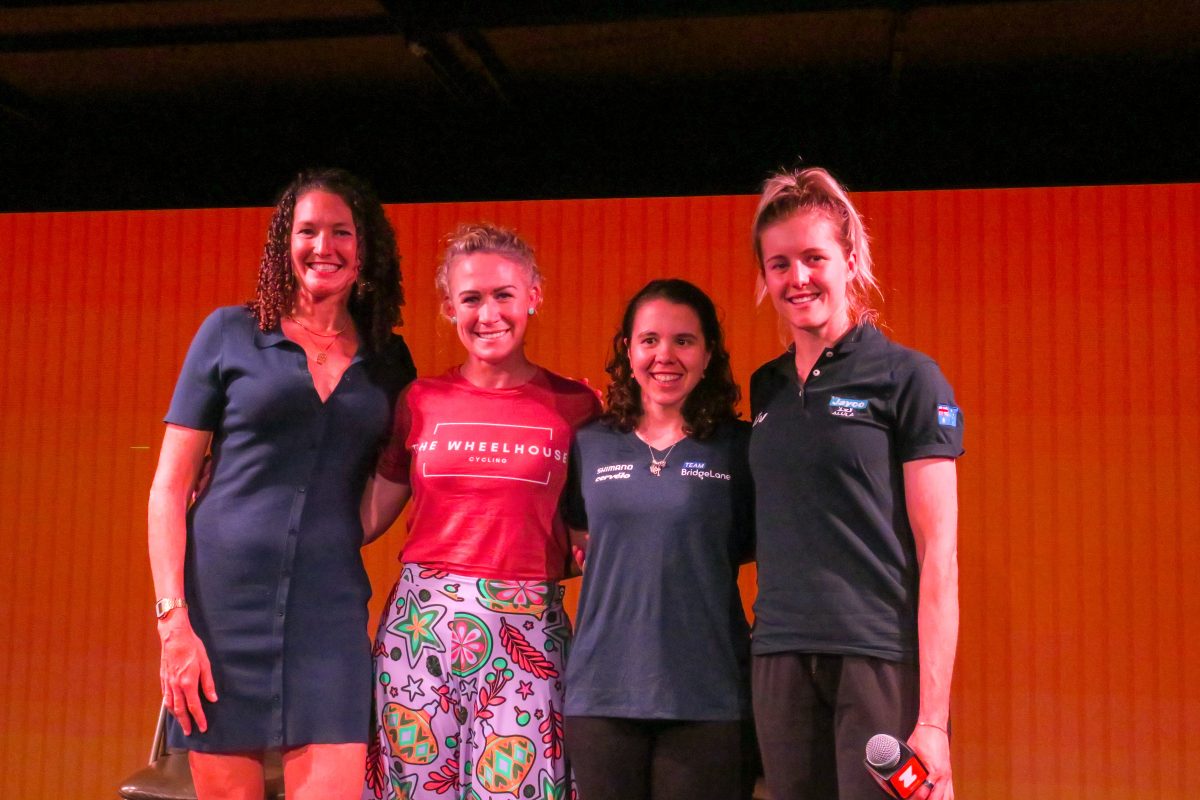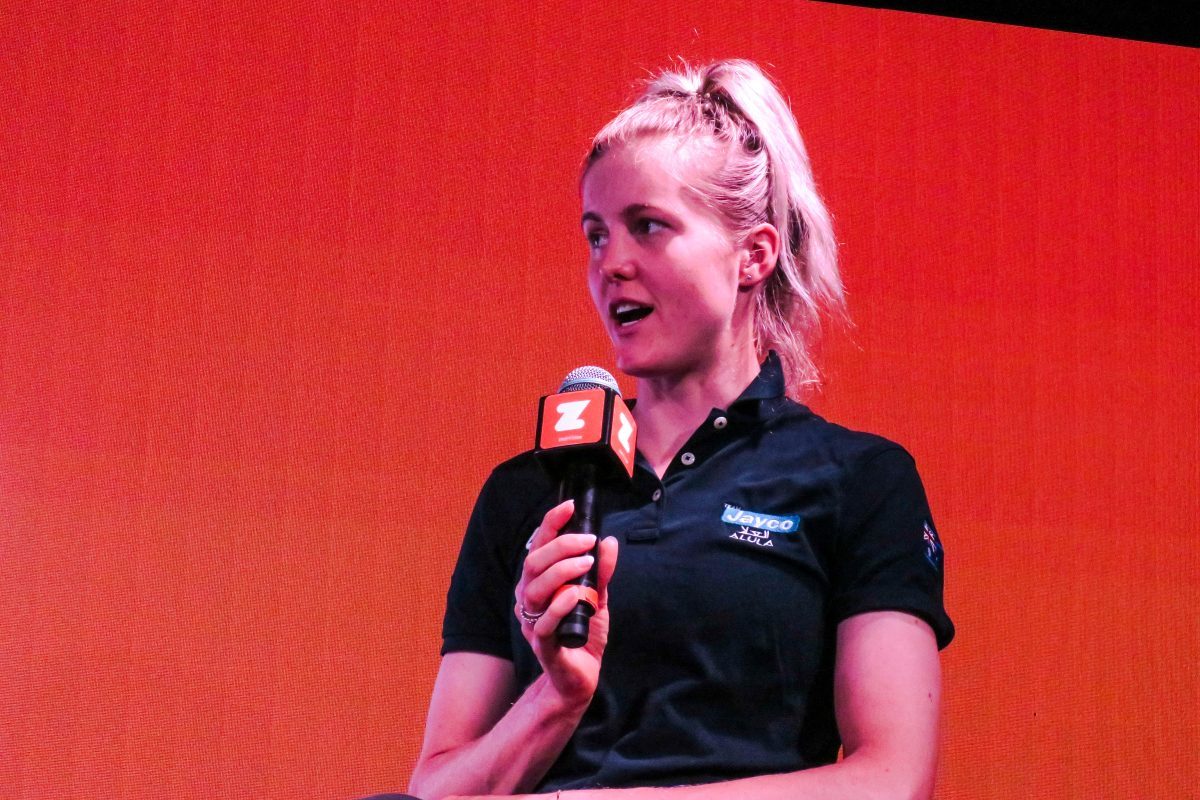At a roundtable held at The Lab last week, four female cyclists acknowledged the gains made in women's sports, but say there's a long way to go until female athletes can make professional careers comparable to men.
There’s ‘work to do’ to put women’s sport front and centre
On Thursday last week, ahead of the first ever Women’s World Tour cycling race at the Tour Down Under, two current and two former professional cyclists sat down to discuss where women in sport sit today, and where they are going.
Women’s sport has been gathering momentum in Australia in recent years, with an increasing amount of representation at an elite level in a variety of nationally cherished sports, including AFL Women’s and Women’s Big Bash League.
Internationally, too, there is a lot to applaud in the uptake of women’s sport; however, the four cyclists at this discussion were not ready to rest on any laurels.
The panel, hosted by Olympian and cycling champion Katey Bates, explored broad issues around gender parity and accessibility, and how to build on efforts to create a more diverse sporting landscape.
Katey was joined by Tour Down Under competitors Jess Pratt and Amber Pate, as well as Kate Veronneau, Director of women’s strategy at Zwift, a virtual exercise/video game company.

L—R: Kate Veronneau, Katey Bates, Jess Pratt and Amber Pate
“It’s been a pretty mammoth year and we’ve had a lot of representation for women across many sporting codes here in Australia,” Katey says.
“[Last year] marked 100 years of the Australian Open women’s tennis, and for the first time in its 10-year history, the National Women’s A-league held their championship matches in primetime.
“Aussie football legend Sam Kerr will also be the first ever female footballer to feature on the cover of the FIFA video game this year.
“We’re moving forward; some people would say at a breakneck speed, other people would say a little bit more like a snail’s pace.”
Sitting before a mixed crowd of media at the futuristically illuminated venue, The Lab, the four unpack the difficulties they face as female athletes that their male counterparts have been immune to.
Kate Veronneau says her own difficulties as a woman in cycling led her to fight for structural change in the sport.
“I raced about 10 years ago. I fell in love with the sport and I got to a professional level only to find out there’s no salary. I was still sleeping on couches; it was it was really hard,” Kate says.
“A lot of the work I do comes from my passion to create more opportunity than I had when I raced.”
Last year she worked through Zwift to help organise the first women’s Tour de France in more than thirty years.

A bicycle set up to play the Zwift app
She also says in 2016 Zwift used its virtual reality cycling video game to help identify female talent for its professional development programs.
“You’ve got to think outside the box,” Kate says.
“Not everybody lives in an area that has a great cycling community, safe roads, or access to equipment. So especially with something like Zwift, you know we can provide a safe space for women especially to train race and social ride together.”
Up-and-coming pedal wizard Jess Pratt mirrors Kate’s concerns on the lack of financial stability in women’s cycling today. At one point she juggled nursing studies with elite-level training.
“I’ve been cycling since I was 12 years old,” Jess says.
“Growing up and racing in juniors, I noticed I had role models going overseas to race their bikes. I’d just hear stories about the fact that they can’t earn a liveable wage and I’d hear all about their poor living conditions.
“Being an Australian you have to head over to Europe to race if you want to further your career, which made it hard to work at the same time.
“It’s also been interesting to see things begin to change in the last few years. Now there’s the minimum wage for anyone competing in the Women’s World Tour, which is really big.
“That obviously increases the competitiveness of the sport and just furthers cycling.”
While for male athletes the elite level of most commercial sports is generally better funded, female athletes often find themselves making tough decisions based on which sport is developed enough to offer a career.
Amber Pate tells how she has seen a change of financial viability after switching to cycling from short distance triathlons.
“Before I switched to cycling, I was extremely exposed to the financial difficulties of the sport,” Amber says.
“I was working two jobs trying to train full time. I traveled to Europe for six weeks to try to get international experience, which, similar to cycling, is essential.
“I came back to Europe with 50 cents in my bank account, absolutely exhausted. I knew that this wasn’t sustainable and I needed to make a change.
“I’m in my first year of professional level in cycling now and the shift has been massive. It is so exciting.
“I got one flight paid for domestically for my entire three or four years in triathlon. I was one of the best swim-bikers in Australia, so I had a lot of potential, but I switched to cycling very, very quickly as I could already see that there were so many more opportunities for me.”
With only seven per cent of televised media coverage in Australia dedicated to women’s sport, attracting sponsors, attention and, in turn, liveable salaries for athletes continues to be a challenge. But globally Kate Veronneau senses a change.
“Now is a great time for cycling. I think that increased investment coming from the increased visibility is really going to continue to spur things forward at a much more accelerated pace,” Kate says.
“We have a way to go but even shortly after the women’s Tour de France happened I was already hearing from teams that more sponsors were coming to the table. Riders were in the midst of negotiating salaries and able to negotiate for higher salaries.
“There’s been a lot of misconceptions that women’s sports don’t make money or women’s sports aren’t as exciting, and those are just consistently being proven wrong across all sports.
“I think the media has a responsibility to cover those really good stories. The media also has to be very intentional with their language. Check for your biases we all have them.”
Perhaps where in the past athletes were at the mercy of mainstream media in regard to the portrayal of their story (if they were portrayed at all), Amber Pate reflects on the role social media plays now.
“It is important today that we are involved in social media. A lot of women don’t like doing that, and I don’t love doing that, but it also comes from a lack of confidence,” Amber says.
“I’ve had to just learn to post what I want to post because that’s the story I want to tell on my albeit tiny platform.”
“Being a woman, you have less television coverage, and without that television coverage we don’t have fans; without fans, we don’t get sponsorships, and ultimately, without sponsorships, we don’t get money. So it is about taking those opportunities.”

Amber Pate speaking at the panel on gender equality in sport
Reflecting on some of the language used to describe women’s sport, including use of the word ‘girls’ over ‘women’, Jess says she often finds herself accepting the status quo.
“Unfortunately sometimes you… feel a little bit trapped as a female. You’re like, ‘Well, that’s what they’re gonna call me’. There’s probably been many times that I’ve just accepted it when I should have spoken up about it.”
Closing the discussion, Kate says she has a bright outlook for the future of women’s sport and women’s cycling.
“What is my end game? Definitely a multi-week Tour de France Femme Avec Swift, seeing minimum salaries for UCI pro teams,” she says.
“I want to see full stages broadcasts of the tour. We had two and a half hours of coverage this year. I want to see the whole thing.
“There’s so much more to be done.”




